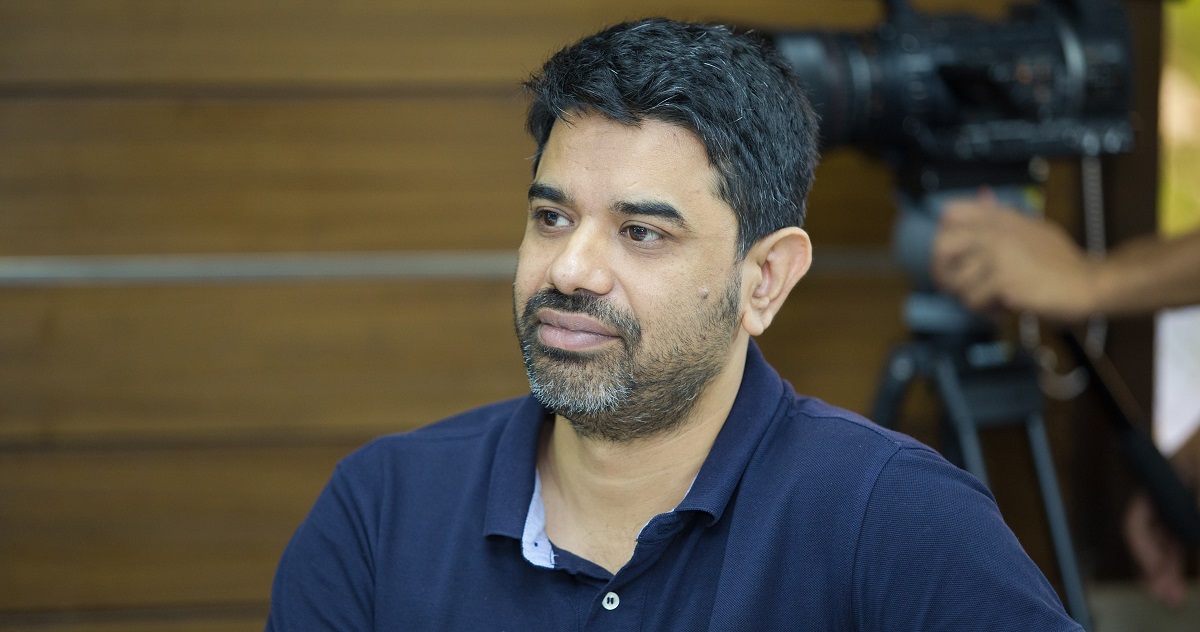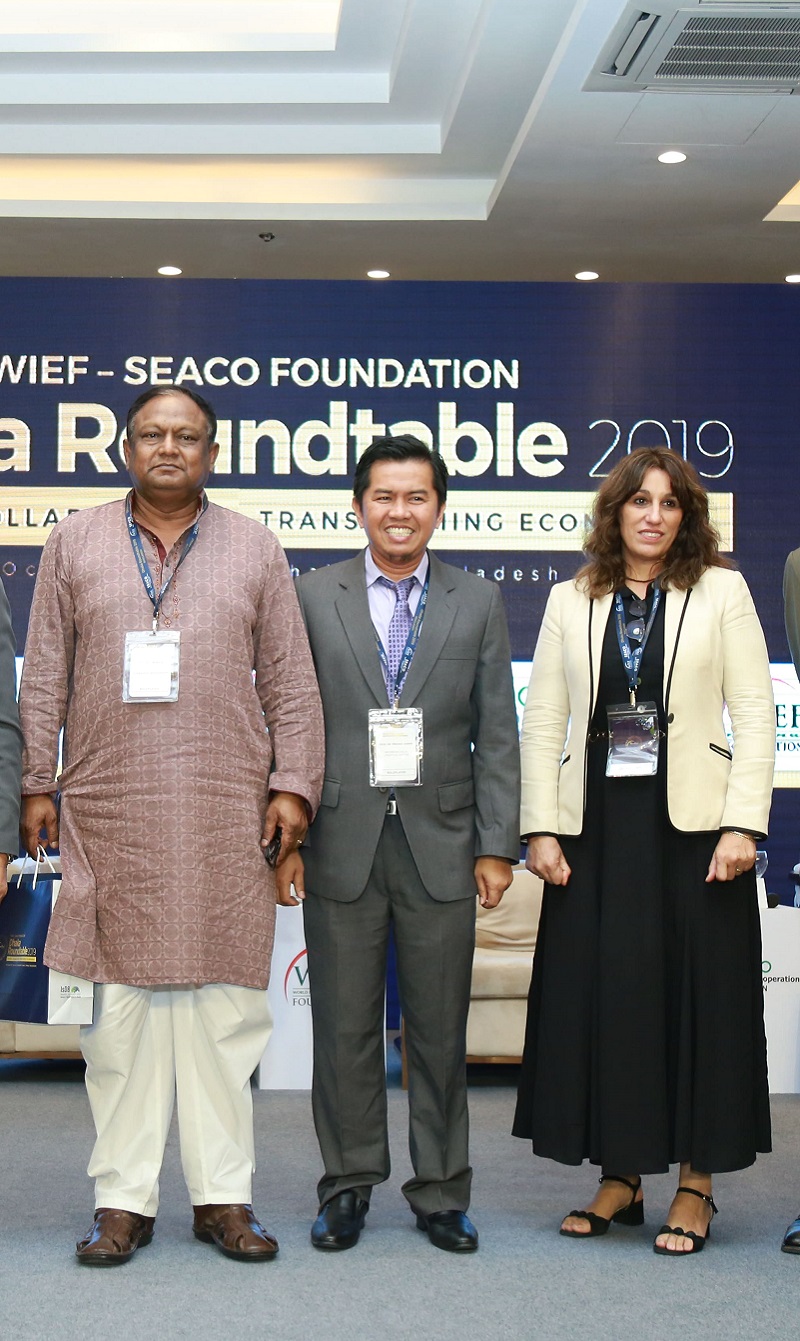Weaving Change
Imagine earning USD75 per month working long hours in a crowded factory making clothes that’ll cost more than you earn. What’s more, your earnings are meant to house, feed, clothe you and your family. This situation is the lot of Bangladeshi factory workers. Reyana Nacerodien chats with an organisation that’s actively changing that. This article first appeared in issue 6 of In Focus magazine.
The garment industry is a multibillion-dollar industry worldwide. The more than four million garment workers in Bangladesh, in part, fuel this burgeoning business though never reap its rewards. Based in Dhaka, APON Wellbeing Limited is trying to change that and, in so doing, create a better future for these factory workers and their families.
The industry
The readymade garments (RMG) sector is now the second largest exporter of apparel in the world and accounts for 85 per cent of Bangladesh’s annual exports. With as many as 5,500 factories employing an estimated 4.2 million workers, of which an estimated 70 per cent to 80 per cent are women, the industry’s prosperity fails to trickle down to the workforce. Bangladesh makes clothes that are exported around the world, but the garment workers are more often than not, poor.
This is where APON is making a difference. Factory workers are being given additional assistance and effective access to a range of services by the locally-based change maker. By essentially, bringing the market to the consumer group, APON is changing lives daily.
The Harsh Reality
Overpopulated locations with often squalid conditions promote a survival reality that is perpetuated from generation to generation. ‘Unfortunately, the huge opportunities in the industry don’t always translate into benefits for the wellbeing of the workers who are employed in this sector,’ explains Saif Rashid, founder and managing director of APON Wellbeing Limited. Many RMG workers labour for 12 or 13 hours daily just to earn enough to survive in Dhaka, the country’s capital, where the cost of living is increasing rapidly.
‘The minimum wage and the gap between the actual earning and living wage is huge. Compared to other countries like Nepal, India and Sri Lanka, Bangladesh has the lowest minimum wage,’ Saif adds. The issues these workers face don’t necessarily make the top of the national or even local priority list. ‘The impact of that is that workers don’t have a healthy and happy life,’ Saif says.
The APON Idea
Illustrating the initiative’s roots, Saif explains, ‘The idea came to me in 2016. I was managing a large, women-based distribution network for daily necessities in Bangladesh. I managed partnerships with more than eight manufacturers of different daily commodities. Destitute women in rural Bangladesh would sell the products of these companies to earn a commission. I knew about the margins that these companies provided at different levels of their distribution system. On the other hand, due to my work with different social and private sector organisations, I was also exposed to the readymade garments sector as well as the challenges the workers face.’
The equitation to utilise the margin to benefit the large workforce, thus, came to Said suddenly at the beginning of 2016. ‘I left my organisation and started prototyping the idea. Soon I got accepted to the program called Fabric of Change by Ashoka and the C&A Foundation – a joint project where I was selected as a Globalizer Fellow that same year and I was granted some seed funding to launch the project,’ says Saif. The seemingly simple idea that forms the basis of the APON model is affecting major change fuelled by Saif’s vision. His personal aim is to ensure that the lives of two million workers in Bangladesh and Asia are transformed and improved. ‘We believe that every worker that works fulltime shouldn’t leave poor. Instead of the need to constantly increase the salaries, we came up with an innovative idea that is now APON,’ Saif explains.
The Model
APON has addressed the primary needs of workers and granted them efficient access to basic services.
Firstly, a national chain of affordable grocery stores has been setup inside factories in Bangladesh. Factory workers are given the opportunity to buy the daily food and hygiene items they need at between eight and 10 per cent less than what they can at other retailers. Through this mechanism, both time and money are saved and workers are able to walk away with more disposable income in their pockets. In addition, workers get access to free health insurance and other wellbeing benefits. Access to interest free credit, awareness initiatives, gifts and special offers are all an added bonus.
All of this is done through a sustainable and innovative business model that involves consumer goods companies, insurance company, banks, apparel factories, large brands, retailers and workers. ‘Our business model is that we negotiate higher margins with the manufacturer and then provide 10 per cent to the workers. A portion of the discount goes to the insurance company as a premium and the remainder stays with us for our operation. To do this, we partner with different companies,’ outlines Saif.
As a serial social entrepreneur, he created a scalable approach to support the RMG sector without relying on donations or grants in order to offer and sustain that support. ‘With a high margin, we can have a well-being scheme for the workers, we can give a discount directly, which will increase their disposable income. And factories can get benefits because this scheme might help them in terms of reducing the turnover of the workers,’ Saif explains.
The sole cost to a factory to participate in APON is the space needed for the shop. Demonstrating to factory owners that this small contribution will lead to a reduction in worker turnover will encourage more willingness to participate in the model. ‘We don’t need funding from the factory for the health of the workers, or funding from the buyer to finance their health, which is always a struggle to get,’ Saif says. ‘Now, workers can generate their own health finance.’
It might be buyers who, alongside enthusiastic workers, will help convince more factory owners to join APON. Brands have in recent years started their own insurance pilots, hoping that factories will take over once they’ve made an initial investment. Such efforts tend to be costly and often fall apart once the buyer pulls out. With APON, there’s no cost to the buyer as the initiative is funded through commission from the sales of household items in the factory shops. The brands Saif works with, so far, express strong interest in his model.
APON Accolades
Some big names have already been convinced of APON’s and, indeed, it’s founder’s transformation vision. In 2019 APON was named the Tommy Hilfiger Fashion Frontier Challenge winner alongside A Beautiful Mess, who offer creative spaces for refugees to help them achieve social and economic independence through creating sustainable clothing products.
The Fashion Frontier global programme, led by the iconic fashion mogul aims to support entrepreneurial start-ups and upscale businesses that are developing solutions that promote inclusive and positive change in fashion. The challenge, only in its second edition, received more than 400 applications of which APON made the shortlist of six finalists who pitched their concepts to a jury panel including several social entrepreneur experts and global Hilfiger executives.
‘From start to finish, I have been inspired by this talented group of social entrepreneurs whose innovations are making the fashion landscape more sustainable and inclusive,’ said Tommy Hilfiger himself. APON was awarded 75,000 euros for creating market opportunities for Bangladeshi factory workers and facilitating their financial upliftment. Even before that, Saif’s vision received commendation. He was elected as an Ashoka Fellow in 2015 and is part of the Fabric of Change. Ashoka and the C&A Foundation that partner on the initiative recognises APON for its potential to shape a more equitable global apparel value chain.
APON Aims
APON has, with the model, met its aims of developing a sustainable platform for workers’ wellbeing in partnership with the factories they work in, consumer goods manufacturers that provide goods and different service providers. The APON team believe that there’s more to do, aiming for irreversible system change.
Factories are starting to come on board too, with interested parties already on a waiting list. ‘We’re working on the logistics of scaling at the moment. If 1,000 workers finish their shift all at once, we can’t serve them all in the shop so we’re testing mail-orders. And some factories have 25,000 employees that require the service. But once we reach our target number of 1,000 workers in one factory, we will be able to replicate the model anywhere and be sustainable,’ says Saif.
Long term, Saif says APON will need to reach about 20 per cent of Bangladesh’s RMG labour force, or nearly one thousand factories, to be financially sustainable. Beyond medical coverage, he hopes to add other benefits to the wellbeing scheme, such as subsidised education for children and even family entertainment options. ‘We have big ambitions for the future,’ Saif adds. ‘We’d like to expand to 100 outlets and serve 700,000 workers by 2022. At the same time, we want to expand to a few other countries in Asia and Africa. We also have plans to initiate new products and services such as credit and saving products, digital wallet options, etc. for the workers besides an advanced salary system. We are also launching our online platform solution later this year.’
A decade from now, Saif and his team hope that the APON model will have become the norm in Bangladesh’s garment factories — a standard benefit through which workers realise a better life for themselves and their families. In so doing, they aim to affect women economic empowerment and strive for the wellbeing of factory workers in order to fuel benefits for their country as a whole.
Bangladesh and APON quick facts
– Bangladesh has a population of over 165 million people and over 20 million reside in Dhaka.
– Bangladesh is the 2nd largest textile exporter in the world employing 4.2 million workers out of 43 million in Asia. Between 50 – 80 per cent of manufacturing employment concentrates in Bangladesh, Cambodia and Pakistan.
– APON aims to increase disposable income, free health services and free financing.
– Each purchase from the shop earns a worker points that accumulate on their APON account. For every 100 Bangladeshi taka (about USD1.25) spent, the worker earns 1 APON point. With 200 points, the worker gains access to APON’s zero-cash health coverage, allowing her to get free medical diagnoses and prescriptions from a doctor.
Benefits for workers versus benefits for factory owners
|
Benefits for workers |
Benefits for factory owners |
| · Easy access to necessities saving time and money · Discounted goods · Health insurance · Access to interest free credit, awareness initiatives, gifts and special offers are all an added bonus |
· Reducing staff turnover and stemming illness · Zero cost · Compliance with national law which requires employee insurance (something international buyers increasingly demand) |
APON’s impact and results between January 2018 and February 2020
– 13 outlets
– 23,000 lives impacted
– 2,000 receive free health services worth USD200
– USD130,000 additional savings generated
– USD600,000 of received free financing
Main photo of Saif Rashid, founder of APON Wellbeing Ltd





